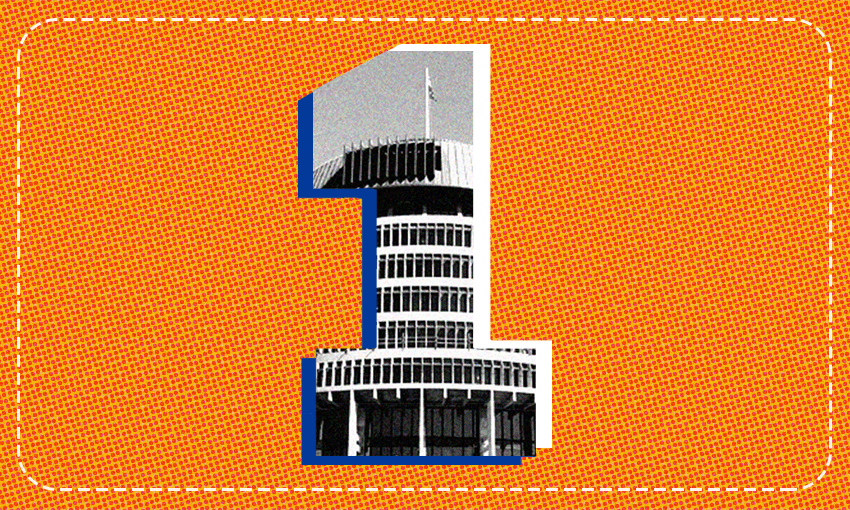Summer reissue: The current coalition not lasting beyond this parliamentary term is an idea that’s been seized on by its opponents. History suggests it’s unlikely – but not impossible.
The Spinoff needs to double the number of paying members we have to continue telling these kinds of stories. Please read our open letter and sign up to be a member today.
First published June 20, 2024.
‘We have a very good chance of making this a one-term government,” said Labour leader Chris Hipkins at his party’s recent regional conference. Though he was no doubt bolstered by a room of supporters on Sunday, as well as recent polls that showed the government’s popularity slipping, it wasn’t the first time Hipkins had used the phrase, and he’s far from alone – it’s been repeated by outspoken opponents of the coalition, including the Green Party, for months. Perhaps now enough time has passed since Labour’s dismal election performance for it to gain traction.
But while “one-term government” is becoming a galvanising phrase among opponents of the current coalition – thrown around not only in political speeches and debates but also at rallies and on social media – it is not a common occurrence in Aotearoa. Keeping in mind that the spirit of the phrase excludes coalition changes, such as the Labour-led government dropping NZ First in 2020, here is the complete history of New Zealand’s one-term governments:
- The second Labour government led by Walter Nash, 1957-60
- The third Labour government led by Norman Kirk and Wallace (Bill) Rowling, 1972-75
To point out the obvious, there have been just two, and both were Labour. If the current government were to last just one term, it would be the first time in history that a National-led government would so quickly fall from power. Single terms are also rare in Australia – there hasn’t been one there since 1931. In Europe they’re much more common, with most countries seeing a change of government at least every two years.
So what happened for those two 20th-century New Zealand governments to lose popularity just three years after coming into power? Could it happen again in 2026?
Jim McAloon, a professor of history at Te Herenga Waka, says it’s likely a coincidence that our only two single-term governments were Labour ones. The commonality that isn’t so coincidental is that “what undid them was economic policy or economic events”, he says. That doesn’t necessarily mean the two governments badly managed economic affairs, “but that they were confronted with circumstances that made life difficult for them”.
The second Labour government came into office in 1957 with just a two-seat majority, so was “always going to have a problem holding on”, says McAloon. It also faced a balance of payments crisis, with export earnings down and imports high, which can lead to rapid decline of a currency’s value. In order to get through that without high unemployment or economic damage, the Nash government’s 1958 budget was “a bit tough”, says McAloon. Raising taxes on beer, cigarettes and petrol, it was called the “black budget” by National leader Keith Holyoake (though he probably didn’t coin the phrase), and the label caught on. Holyoake was “a very, very effective and skilled politician”, says McAloon, and was able to run the all-too-familiar National Party line that Labour were bad economic managers and all too happy to raise taxes. “That doesn’t change, does it?” notes McAloon. “Holyoake just said black budget, black budget, black budget every week for three years.”
When the next election rolled around in 1960, Labour was turfed out. It’s wasn’t only that National won over Labour voters, McAloon says, but also that many Labour voters stayed home – something that played a part in Labour’s defeat in the 2023 election too.
The next one-term government came after 12 years of National in charge. The Norman Kirk Labour government was voted in with a huge 23-seat majority amid a national mood that it was time for change. Television had become an important part of politics, and Kirk was good at it. McAloon describes him as “a big, big man and compelling public speaker” who was so popular that a song about him, ‘Big Norm’ by the band Ebony, was fourth on the national charts in January 1974. Unfortunately for Labour, Big Norm died of heart failure in 1975. “That did not help,” says McAloon. His successor, Wallace (Bill) Rowling, was not so good at the theatre of politics, and struggled to assert authority.
Then, the booming economy came to an end. Inflation soared. It was not through Labour’s economic mismanagement, but because the price of oil shot up and pushed the western economic system into a recession, and New Zealand went down with it. Suddenly we were spending much more on imports, and the market for our exports contracted. The UK joined the European Economic Community and we could no longer count on them to lap up our sheep and lamb. A big personality entered the contest for prime minister – Robert Muldoon became leader of the National Party in 1974. He “campaigned on the basis that everything was their fault, you know, which was quite unfair – but politics isn’t fair”, says McAloon, who adds that Muldoon was “pretty good at scapegoating and dog-whistle racism and accusing Labour of being a bunch of out-of-touch, elitist intellectuals”. In the 1975 election, Labour’s majority was reversed.
But economic downturns can’t be wholly blamed for governments lasting only a single term, as they’re not the only ones to have faced them. After the wool market collapsed in 1966, the National Party won a third term. The Muldoon National government also held on through the oil shock of 1979. The National government that delivered the “mother of all budgets” in 1991 did scrape into a second term in 1993, although there was a major swing away from its previous landslide win in 1990. The global financial crisis hit at the end of the three-term Helen Clark Labour-led government, with the 2008 election seeing the beginning of the John Key-led National/Act/United Future/Māori Party three-term government. Three is the most common number of terms for New Zealand governments to last, and there have only been a couple of four-term ones. McAloon says perhaps that’s because “if you’re in power for a long time, inevitably people get bored, disillusioned, annoyed, and just think, ‘Oh, well, time for a change.’”
Something else to consider is that both the second and third Labour governments were elected under a first past the post system – “winner takes all, if you like,” says McAloon. There were no king-makers or parties to form stronger coalitions with. It didn’t take a huge swing of voters to knock seats off a government. Under MMP the whole mechanism is different, with coalitions and blocs that need to be considered. “The likely coalition partners also have to maintain their share of the vote and a reasonable degree of discipline themselves,” says McAloon. To some extent the major parties need their votes too.
As for today, McAloon says the current government is gambling that social conservatism will win them more votes than economic austerity will lose them. He’s noticed this government blaming the previous for a bad economy, just like Muldoon did in 1975. “It’s an easy dodge to simply blame the last lot for everything.” Of course, National is not the only party that does that.
There’s some truth, McAloon thinks, in the cliche that oppositions don’t win elections, governments lose them. “I don’t think that’s going to work for Chris Hipkins, though,” he says. “I think he needs to pitch an alternative view, especially if he’s hoping to make Luxon’s a one-term government.” He says getting voters to switch back to Labour, or getting Labour voters to turn up, will take persuasion – not just waiting for the coalition to lose popularity.
Hipkins’ pitch on Sunday to push out the government after one term included being an effective opposition, having new ideas and policies to capture imaginations, and rebuilding and broadening the Labour movement. Greens co-leader Chlöe Swarbrick, who called for a one-term coalition government during her “state of the planet” speech in May, went beyond parliament to organising people to resist and put pressure on the coalition. Either way, if the opposition want to make history by adding a National-led government to our very short list of one-termers, they’ve got about two years and five months of hard work in front of them.



